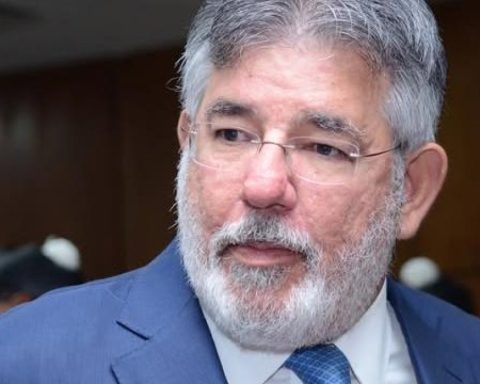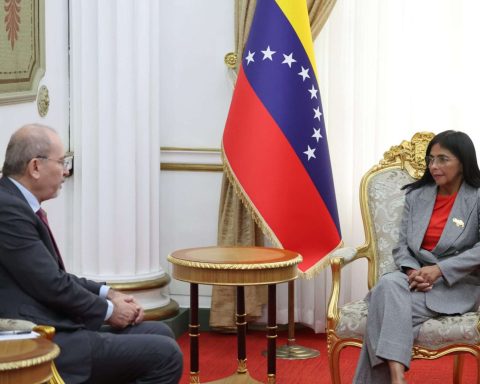In the eighties there were stereotypes in international politics, imposed by propaganda, difficult to uproot. One of them was the idea of an Israel that was the product of the ambition of the capitalist powers in opposition to the wishes of the Soviet Union. The truth was, however, that the Jewish state, whose creation the Kremlin promoted and defended, was born and grew against the will of the big oil interests of the United States and Britain, then the great colonial power in the Levant. The case of Israel, like many others worthy of separate analysis, shows that the so-called “communist morality” did not respond to the interests of an ideology, Marxism, but rather to the interests and guidelines of a particular country, the Soviet Union. , and mainly of the leaders who at a certain moment directed and controlled the Communist Party.
In 1947, at a time when Moscow passionately defended the right of the Jews to have a state or national home in Palestine, British oil interests moved to disrupt the idea of a Jewish nation. England was then a power in decline. The Kremlin knew, in turn, that the creation of a Zionist state would constitute a factor in the deterioration of British influence in the region, since the Jews had already fought against the colonial power of London. Then there was the mistrust that Arab feudal lords and oil sheikhs instilled in the communist world. Arab nations, especially Egypt and Syria, had collaborated closely with Nazi Germany. Stalin and other Eastern European Marxist leaders, just beginning to emerge from the ruins of war, had fresh in their memories the fact that Muslim commandos had fought within the German army in Eastern Europe. The long months of the Nuremberg trial had exposed the atrocities many of those commandos had committed in the death camps of Hitlerian madness. The Grand Mufti of Jerusalem, who led the Arab opposition to the formation of a Jewish state in the way that had been agreed by the United Nations in its historic resolution of November 1947, had found refuge in Nazi Berlin, evading justice. british. From Hitler’s stations, the Arab religious leader exhorted the Islamic world to rebellion against the allies.
His appeals were well received in Iraq, Syria and Egypt, where Nazism found willing collaborators and sources of resistance against England and the rest of the Allies. Despite what many were led to believe, the big oil companies did not support the creation of the Jewish state. On the contrary, they fervently opposed it. Nor is it true that the United States supported Israel militarily in the early years of independence. The weapons with which the Jews fought the Arabs in 1948 and 1956 were acquired first in Czechoslovakia, circumventing an English blockade, and later in France. Until weeks after the Six Day War in 1967, when de Gaulle declared an embargo on war supplies to Israel, France was virtually the sole supplier of the Jews.
The significant US supplies came after the Yom Kippur War in 1973, not before. Rethinking these issues was almost an obligation at a time when propaganda worked incessantly to establish false truths useful for the propagation of this totalitarian ideology, at the exclusive service of the interests of the gerontocracy of the Kremlin and the Soviet Communist Party, nothing more. –0— Multinational companies, said the communists, constituted the most complete form of exploitation of the Third World by imperialism. North American. However, one of the few spheres of Soviet international trade that brought benefits to the Kremlin was precisely its growing activity through prosperous multinational companies.
To the art of making good money, necessary to the calamities derived from an economy lacking hard currency, these companies served no less lucrative objectives of espionage and subversion in the countries where they operated or with which they did business. By the end of 1978, Soviet multinational companies operated in about 26 countries, through a network of more than 80 companies in almost the entire world, including the United States. This capitalist practice, so strange to Marxist orthodoxy, contributed to improving over the years, as these companies grew and expanded, the infiltration capacity of the communist superpower.
Many of the Soviet government’s hard-currency problems were alleviated with the profits made by this non-Marxist entrepreneurial effort of the Moscow hierarchy. Although it may seem like an exaggeration, the need for foreign currency, dollars, yen, marks, etc. It was as parental in the USSR as it was then in the Dominican Republic, keeping proportions of course. Behind these Soviet commercial techniques were hidden three fundamental objectives: to increase the possibilities of collecting secret Western information, both industrial and military; obtain hard currency for the purchase of advanced technology and food and, naturally, achieve political goals. They all had the same priority.
Despite their contempt for capitalist business practices, the Kremlin’s multinationals abided by the same rules. They moved in the circles of high finance and business with the same skill and sense of profit as those established at the very heart of American capitalism. Their techniques for obtaining promising business or contracts were identical. In terms of operation, there were very few differences regarding what strictly concerned the business nature, since it was of vital importance for the USSR that these companies obtained considerable profits.
The sense of social responsibility, so developed in many Western multinational companies established in Latin American countries, was perhaps the only thing that made them different. In addition to their clearly defined political objectives, these Soviet companies, which covered such dissimilar businesses from the sale of vodka and the export of tractors, to stock market speculation, their purpose was always to make money with which to improve the situation of the USSR. So in those moments, the weaknesses. Moscow capitalists constituted one of the solid pillars of its economy. In an analysis of such an interesting facet of communist evolution, the American researcher David A. Heenan said: “…the multinational companies in the hands of Moscow direct and control a network of espionage that is expanding without ceasing. The Kremlin takes seriously the function of collecting classified or secret data; everyone is well aware of your absolute tendency to accumulate files of reliable information on foreign affairs. But whatever the target, Russia’s multinational corporations are a very convenient organizational tool for listening and spying behind the doors of business centers in Western countries.
A good part of these companies sustained themselves from the exploitation of natural resources in developing countries, although their main activity was carried out in some cases in the highly industrialized West, where their work was more lucrative in all senses. Despite the latter, it was obvious that, according to Marxist reasoning and dialectic, the prosperity of these companies was closely related to the exploitation and looting of Third World resources. The truth was that there was no embarrassment when, here as elsewhere, the communists raised, and still does, the “danger” of multinationals and referred and refer to them as instruments at the service of domination and neo- colonialism. But that was nothing strange. The most intense campaigns against disarmament were promoted by supporters of Moscow, the largest military power in the world at the time. And nobody defended, in a democracy, of course, the rights to free movement, freedom of expression and ideological pluralism, with the passion with which a communist did. Rights precisely that never existed in the Soviet Union or in any other nation governed by a Marxist government.
–0—
One of the serious errors of judgment that was incurred when evaluating the quality of the Marxist regimes in the Soviet Union and Cuba, to specify two cases, was that the repression, in those countries, constituted an isolated phenomenon, which fell within the strict jurisdiction of the personality of the dictator on duty. This myopic perception has cost dearly. The repressive and totalitarian character of communism always resided in the very nature of the system. In its years of consolidation, the Bolshevik revolution used mainly mass denunciation to carry out policies and ensure party leadership.
The children betrayed their parents, the brothers to brothers, the bosses to subordinates and these to those. During Stalin, the USSR, the workers’ paradise, was a huge prison for the proletariat. In any case, Stalin did nothing more than continue the line that Lenin had traced to his fellow party members. The social nature, embodied in the theory of the Dictatorship of the Proletariat, gave way very early in the history of the Marxist revolution to the more pragmatic one of the party dictatorship, which ensured the control of the State by a few at the top of a power full of privileges for the apparatchik, or bureaucrats of the party machine. The Soviet Communist Party, and this line was followed in all the other countries under Marxist rule, which claimed to represent the interests of the working class, stood above it. The October revolution was carried out with the lack of support of the Russian workers and in many cases with their opposition. Rural collectivization had to be carried out over millions of corpses of men, women and animals.
The cost in life of this decisive step in the Soviet revolutionary process later turned out to be less than the social and economic cost, as agricultural and livestock losses unleashed incredible famine over vast Russia. Terror, at one time based on massive denunciation, was extracted in Cuba and the USSR from the very nature and objectives of the prevailing system in those countries. In essence, communism is totalitarian, by denying the fundamental freedoms and rights of the components of a society, either individually or collectively. A leader does not make him more humane or less repressive. Lenin said that it was the duty of revolutionaries to oppose and fight bourgeois liberties, as long as it was necessary to ensure the liberation of the proletariat. What does this mean? That the interests of the community, of the working class, in a general sense, is determined by a ruling bureaucracy that acts more in favor of its own economic, social and political security than with respect to anything else.
Maximo Gorki, who at the beginning of the Revolution denounced the abuse of power and the tyranny of the Bolshevik leaders, later summed up the essence of revolutionary power in a diabolical phrase: The enemy surrenders or is destroyed…

















